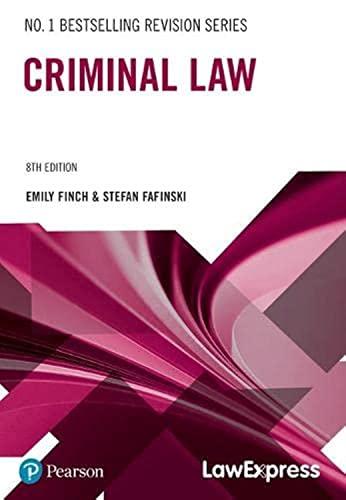Question
Articles 1291-1304. MULTIPLE CHOICE: Choose the letter of the correct answer. 1.It is the extinguishment of an obligation by the substitution or change of the
Articles 1291-1304.
MULTIPLE CHOICE: Choose the letter of the correct answer.
1.It is the extinguishment of an obligation by the substitution or change of the obligation by a subsequent one which extinguishes or modifies the first.
a.Compensation
b.Novation
c.Condonation
d.Merger
2 Which of the following statements concerning the type of novation is incorrect?
a.Subjective or personal novation is the modification of the obligation by the change of the subject; it is passive if there is substitution of the debtor, and it is active when a third person is subrogated in the rights of the creditor.
b.Objective or real novation is the change of the obligation by substituting the object with another or changing the principal conditions.
c.There is total novation when there is only a modification or change in some principal conditions of the obligation.
d.There is implied novation when there is such an incompatibility between the old and the new obligations that they cannot stand together.
3. The following are the requisites of novation, except
a.There must be a previous void obligation.
b.There must be agreement of all parties to the new contract.
c.There must be extinguishment of the old contract.
d.The new obligation must be valid.
4. Which of the following statements concerning novation is incorrect?
a.In order that an obligation may be extinguished by another which substitutes the same, it is imperative that it be so declared in unequivocal terms.
b.Novation is never presumed.
c.There is implied novation if the old and new obligations are on every point incompatible with each other.
d.Novation must only be expressed and not implied.
5. Novation which consists in substituting a new debtor in the place of the original one, one may be made even without the knowledge or against the will of the latter, but not without the consent of the creditor. Which of the following statements concerning the two forms of this novation is correct?
I.In Expromission, the initiative for the change does not emanate from the debtor and may be made even without his knowledge, since it consists in a third person assuming the obligation and it logically requires the consent of third third person and the creditor.
II.In delegaction, the debtor (delegante) offers and the creditor (delegatario) accepts a third person (delegado) who consents to the substitution, so that the consent of these three is necessary.
a.I only
b.II only
c.Both I and II
d.Neither I nor II
6. In what type of novation consisting of substitution of a new debtor will the insolvency of new debtor or non-fulfillment of the obligation shall not give rise to any liability on the part of the original debtor?
a.In expromission because the debtor did not have the initiative in making the change, which might have been made even without his knowledge.
b.In delegaction because the creditor consents to the substitution.
c.In either expromission or delegacion.
d.Neither expromission nor delegacion.
7. In delegacion, will the insolvency of the new debtor, who has been proposed by the original debtor and accepted by the creditor, revive the action of the latter against the original obligor?
a.No, under any circumstances because the obligation is already extinguished.
b.Yes when said insolvency was already existing and of public knowledge, or known to the debtor, when he delegated his debt.
c.Yes even of the creditor has knowledge that the new debtor was insolvent at the time of delegation.
d.No because the debtor has not given his consent to the delegation.
8.The following statements concerning novation are correct, except
a.When the principal obligation is extinguished in consequence of a novation, accessory obligations may subsist only insofar as they may benefit third person who did not give their consent.
b.If the new obligation is void, the original obligation was extinguished, unless the parties intended that the former should subsist in any event.
c.The novation is void if the original obligation was void, except when annulment may be claimed only by the debtor, or when ratification validates acts which are voidable.
d.If the original obligation was subject to a suspensive or resolutory condition, the new obligation shall be under the same condition, unless it is otherwise stipulated.
9. Which of the following statements concerning subrogation is correct?
a.Subrogation of a third person in the rights of the creditor is either legal or conventional.
b.Legal subrogation is not presumed, except in cases expressly mentioned in this Code.
c.Conventional subrogation must be clearly established in order that it may take effect.
d.Conventional subrogation of a third person requires the consent of the original parties but not of third person.
10. The following are the instances wherein legal subrogation is presumed, except
a.When a creditor pays another creditor who is preferred, even without the debtor's knowledge.
b.When a stranger pays a creditor without the knowledge of the debtor.
c.When a third person, not interested in the obligation, pays with the express or tacit approval of the debtor.
d.When, even without the knowledge of the debtor, a person interested in the fulfillment of the obligation pays, without prejudice to the effects of confusion as to the latter's share.
Step by Step Solution
There are 3 Steps involved in it
Step: 1

Get Instant Access to Expert-Tailored Solutions
See step-by-step solutions with expert insights and AI powered tools for academic success
Step: 2

Step: 3

Ace Your Homework with AI
Get the answers you need in no time with our AI-driven, step-by-step assistance
Get Started


